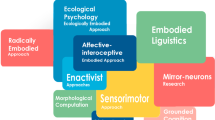Abstract
On the face of it, the perspective that Casper puts forward in his paper (Chap. 2) and the one I offer in mine (Chap. 4)are completely at odds with each other. He sees the current diversity of explanations, theories and methods in embodied cognitive science as problematic and calling for some kind of integration, whereas I defend an extreme pluralist stance and don’t see the diversity as a problem. Not only that, but while he argues for coordination between the disparate approaches, I propose that expecting such coordination is in many cases unrealistic and moreover that, even when it’s possible, it might be counterproductive. The straightforward thing to do now would be for me to double down and use this space to try to show why I’m right and Casper is wrong. But I don’t think he’s wrong. He and I do disagree, but I don’t think it’s that sort of disagreement where only one side can be right and the other must be wrong. In particular, I don’t think that focusing on the different conclusions he and I draw in our respective chapters is a fruitful way to understand the nature of our disagreement. My goal in this commentary will be to explain why. I don’t know if Casper will agree with my assessment or not, but I won’t be surprised if he doesn’t—in fact, as I will suggest, this would make perfect sense given what I propose in my chapter. Still, my hope is that, by clarifying how (from my perspective) our different views relate to each other, I can help some readers better appreciate both his proposal and mine.
Access this chapter
Tax calculation will be finalised at checkout
Purchases are for personal use only
Similar content being viewed by others
Notes
- 1.
This idea is not new, and dates back at least to the classical pragmatists: Peirce talks about “The irritation of doubt” as causing “a struggle to attain a state of belief” (1966, p. 99), while James describes “The transition from a state of puzzle and perplexity to rational comprehension” as being “full of lively relief and pleasure” (1879, p. 317); Dewey makes similar remarks (see, e.g., Luntley, 2016).
References
James, W. (1879). The sentiment of rationality. Mind, 4, 317–346.
James, W. (1896). The will to believe: And other essays in popular philosophy. Longmans.
Luntley, M. (2016). What’s the problem with Dewey? European Journal of Pragmatism and American Philosophy, 8(VIII-1).
Peirce, C. S. (1966). The Fixation of Belief. In Philip P. Wiener (Ed.), Selected Writing (Values in a Universe of Chance) (pp. 91–112). Dover Publications.
Author information
Authors and Affiliations
Corresponding author
Editor information
Editors and Affiliations
Rights and permissions
Copyright information
© 2023 The Author(s), under exclusive license to Springer Nature Switzerland AG
About this chapter
Cite this chapter
Sanches de Oliveira, G. (2023). A Professional Guide to Explanation. Commentary on “A Methodological Problem of Choice for 4E Research”. In: Casper, MO., Artese, G.F. (eds) Situated Cognition Research. Studies in Brain and Mind, vol 23. Springer, Cham. https://doi.org/10.1007/978-3-031-39744-8_3
Download citation
DOI: https://doi.org/10.1007/978-3-031-39744-8_3
Published:
Publisher Name: Springer, Cham
Print ISBN: 978-3-031-39743-1
Online ISBN: 978-3-031-39744-8
eBook Packages: Religion and PhilosophyPhilosophy and Religion (R0)



